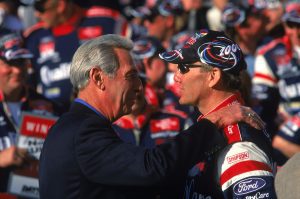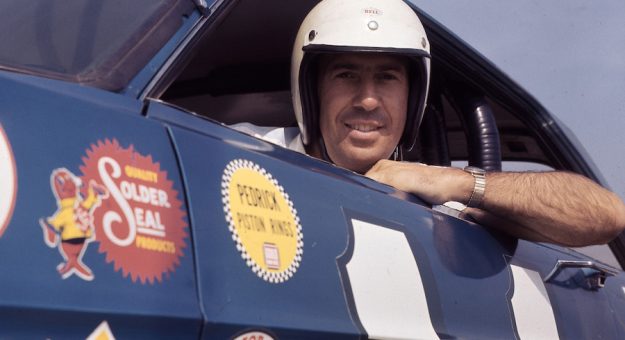At age 91, Ned Jarrett has time to reflect on his amazing life.
The former farmer and sawmill worker made his first attempt as a race driver at Hickory (N.C.) Motor Speedway in 1951. His parents, Homer and Eoline Jarrett, weren’t happy their son was hanging out with such a scrupulous crowd on Saturday nights.
John Lentz, Jarrett’s former brother-in-law, owned a race car, and Lentz offered Jarrett the ride when he decided to stop driving. Jarrett stayed with it and claimed the 1955 championship at the Hickory track.
“I used John’s name at first until my dad found out and then I used my own,” Jarrett said. “I knew after that first race it was something I wanted to do. It was a long time coming before I could make any money at it. I just loved doing it.”

Jarrett’s success in sportsman competition led to his first start in the NASCAR Cup Series (Grand National) at Hickory in 1953. Driving a 1950 Ford for team owner Mellie Bernard, he finished 11th. The next week, Jarrett entered the 1953 Southern 500 at Darlington (S.C.) Raceway but went to the garage area after only eight laps with a broken oil line.
It took six years for Jarrett to resurface in NASCAR’s premier series.
Jarrett’s closest rival in the sportsman ranks was 1956 champion Ralph Earnhardt, a driver he beat for the sportsman title in 1957 and ’58 after entering 150 races and winning 80 of them over two seasons.
To make a name for himself in NASCAR’s elite series, Jarrett bought a top-flight car in 1959 for $2,000 by writing a bad check. To cover it, he had to miraculously win back-to-back Cup Series races on two very difficult short tracks.
Junior Johnson had been winning regularly in a 1957 Ford owned by Paul Spaulding. A new Dodge was being built for Johnson and the potent Ford was for sale. A bad check meant possible jail time and writing it was the biggest risk of Jarrett’s life.
“I knew I could do it if I could get in the right car,” Jarrett said in a 2019 article published in Autoweek Magazine. “I didn’t have any money. I figured I’d go to Myrtle Beach Saturday night and win that race and do the same thing the next afternoon at Charlotte. I knew winning both would earn about $2,000, and I could make up whatever difference there was by borrowing the money and get into the bank by Monday to cover the check.”
Jarett started ninth in the 200-lap event at Rambi Raceway in Myrtle Beach, S.C., and he beat Jim Paschal to the checkered flag by a full lap of the half-mile dirt track.
A deep cut to his finger caused by tape wrapped on the car’s steering wheel was treated at a Conway, S.C., hospital en route to the next race at the Charlotte Fairgrounds. It caused him great pain and repeatedly filled the bandage with blood.
Jarett started the Sunday afternoon event but was soon relieved by Joe Weatherly, who did not have a car to drive at Charlotte. Then, after exiting the race due to a blown engine, Johnson replaced Weatherly in his old ride and carried it to victory.
Jarrett’s weekend winnings totaled $800 for Myrtle Beach and $800 for Charlotte and by borrowing the rest to cover the check, he slept easy Monday night.
In 1960, Chevrolet saw potential in Jarrett’s driving ability and he eventually won seven Cup Series for the GM brand. One came during the 1961 season and the other six came the following year.
The remaining 43 Cup Series victories of his career were in Fords. To this day, Jarrett has more victories in a Ford than any other driver.
Throughout 1963, Jarrett drove for team owner Charles Robinson. That year, he amassed eight wins and 32 top-five finishes in 53 starts.
A tremendous opportunity came Jarrett’s way for the 1964 season and that proved to be his best year with 15 victories. Bondy Long, an heir to the DuPont fortune, came into NASCAR as a young team owner, first with Larry Frank for five races and Bobby Isaac for 26 races as his drivers in 1963. When Isaac moved to Ray Nichels’ team in 1964, Jarrett became his driver and team manager per the request of a banker, lawyer and accountant representing the DuPont family. All agreed Jarrett was the perfect man for the job.
